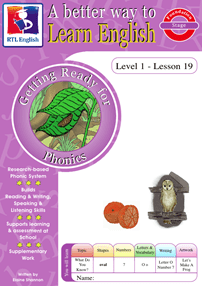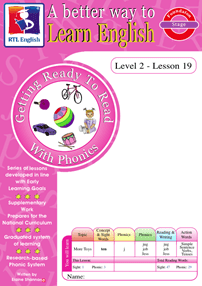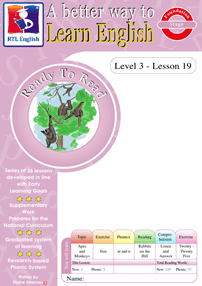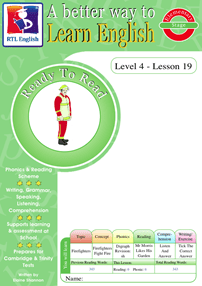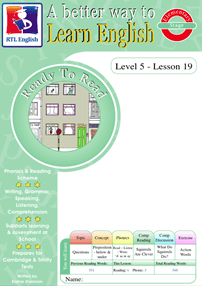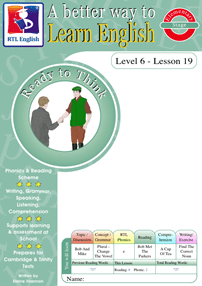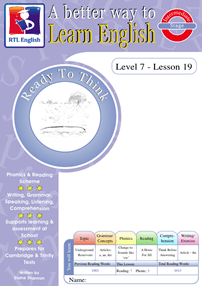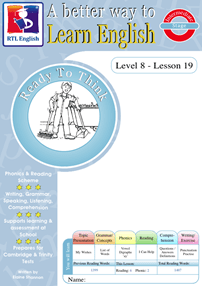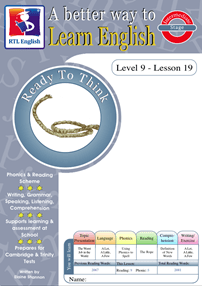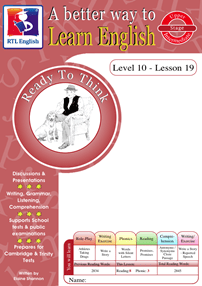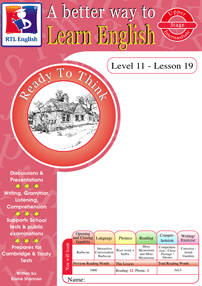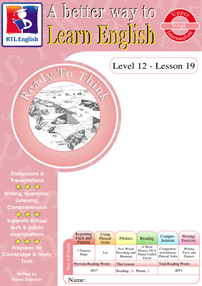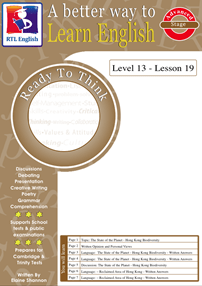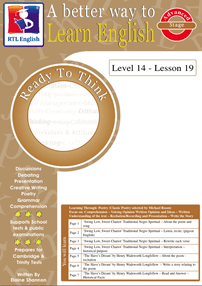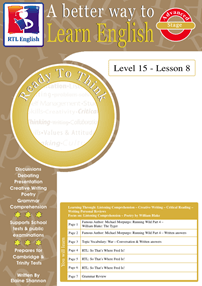English lessons for kids in Hamilton, South Lanarkshire

RTL English will help you teach English to your child or student in Hamilton.
RTL English helps parents, tutors & teachers to teach English to children aged 3 to 18 years old, so that they can succeed at school, in exams & beyond.
Our step-by-step, downloadable lesson workbooks are print-ready & easy to teach. They are part of a award-winning teaching system that’s been taught millions of times, and proven over 24 years in 23 countries worldwide.
Our workbook lessons will enable your child to catch up, keep up & get ahead! Our workbooks also challenge more advanced students; so whatever your son or daughter’s ability, there’s sure to be an RTL English lesson workbook that’s suitable for them.
RTL English is a leading English language teaching organisation that’s recognised around the world for its transformational & proven method of teaching English to students.
For over 20 years, RTL English has been taught at home, in tutorial centres & at schools both as part of the curriculum & as a supplementary activity. RTL English is growing in popularity worldwide, so why not join 1000000’s of parents, tutors & teachers around the world and teach your son or daughter RTL English today?
Teaching your son or daughter to use English fluently might very well be the key to his or her success at school in South Lanarkshire, in exams, in his or her career & beyond.
Imagine your child several months or years in the future … in Hamilton or elsewhere …
Is your child a smart child because he or she became an early reader, acquired a passion for knowledge, obtained early language and literacy skills and developed an air of confidence that will last them a lifetime?
Or is your son or daughter struggling to read, underperforming at school and set-up for a lifetime of frustration and disappointment?
Of course everyone wants to be the proud parent of a happy and confident child, & every parent can.
But, in order to guarantee a bright future for your son or daughter in South Lanarkshire, it’s often necessary to take your son or daughter’s education into your own hands.
If you want your child to grow up to be smart and successful, then you need to underst& how important it is that you teach your son or daughter when his or her brain expansion is at its apex.
The cerebral cortex in your son or daughter’s brain is responsible for his or her sight, hearing, & smell. It also controls their speech, thinking, & memory. In fact, the cerebral cortex is what makes them – them! At birth, the cells in your child’s cerebral cortex were poorly connected (they are for everyone). However, by 2 to 3 years old, the cerebral cortex contains 100 trillion connections. and that number remains high until the 8th when it begins to slowly decline & level off to adult levels (*Ref). It’s very important to take the opportunity to teach children during this time when brain development is peaking.
Teaching English to your child might be the key, not only to their success in school in Hamilton, but also their sense of self-worth, both in South Lanarkshire and beyond.
Elaine Shannon, Author & Curriculum Designer Tweet
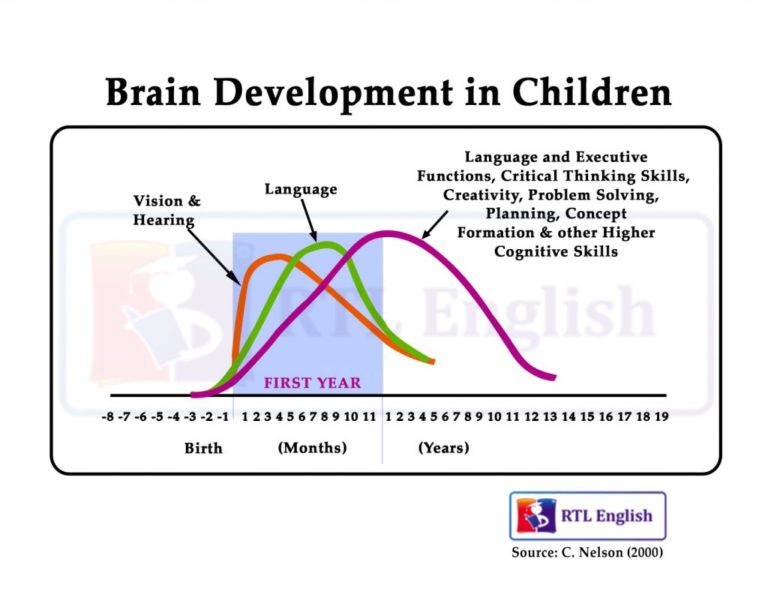
- Early & advanced English skills will make your son or daughter smarter.
- Early & advanced English skills will improve problem solving.
- Early & advanced English skills will improve planning, and abstract thinking skills.
- Early & advanced English skills will help develop complex idea comprehension.
- Early reading can help children compensate for modest levels of ability in other areas. (*Ref)
ON A PRACTICAL LEVEL, HOW IMPORTANT IS EARLY READING?
- Your son or daughter’s reading ability and vocabulary at 3 years old might predict his or her success in school in Hamilton when they are 6 to 7 years old (*Ref).
- Your child’s reading ability at 6 to 7 years old might predict his or her success at 17 to 18 years old (*Ref)!
- Your son or daughter’s reading ability at 7 to 8 years old might determine their graduation from senior school in Hamilton (*Ref).
ON THE OTHER HAND:
- Children who can’t read competently by 7 to 8 years old are four times more likely to leave school without a diploma/results than proficient readers (*Ref).
and:
- Children who are not taught Phonemic Awareness, and therefore have to rely on memory have difficulty beginning to read & continue to have difficulty with new words.
BUT, SURELY SCHOOL WILL TEACH MY CHILD TO READ? SO, WHY DO I NEED TO BOTHER?
If this is what you are thinking, then you should know that you cannot rely on schools, including those in Hamilton …
- In the USA, almost 70% of children at school who are aged 9-10 years old cannot read proficiently (*Ref)!
- And, of those children, 33% of them read at only a very basic level, & 34% are reading at a very poor level (*Ref).
- It’s not so different in the UK, where over 100,000 children leave school illiterate(*Ref).
- Or in Australia, where 33% of students aged 11 years old fail to meet literacy benchmarks (*Ref).
- Or in Canada, where 42% of the entire adult population is only semi-illiterate (*Ref).
NO, YOU CANNOT RELY ON SCHOOLS.
But, why not?
- Teachers don’t always appreciate the basic units of language & reading
- Teachers all too frequently don’t know how to teach English language concepts
- There just aren’t enough qualified teachers
- Classes are too large
- Kids don’t get enough attention from teachers in the classroom
- Schools aren’t using the correct teaching systems – i.e they rely on rote learning or sight words
- Schools are overwhelmed and have tried to shift some of the burden of teaching onto apps & computers
UNFORTUNATELY, IT IS A FACT THAT:
Being illiterate is a guaranteed ticket to a dead end.
YOU NEED TO TAKE CHARGE OF YOUR CHILD’S EDUCATION – TODAY!
BUT HOW?
You can begin by teaching English to your son or daughter.
By Teaching your son or daughter to read your son or daughter will develop early reading skills that will help put them years ahead of other children in South Lanarkshire. So, if you’ve decided that you want to become a proud parent of a happy and smart son or daughter, then you owe it to your son or daughter to teach them to read and improve their English.
WE HELP PARENTS TEACH ENGLISH TO CHILDREN
RTL English™ offers 600 easy-to-teach & downloadable English lessons for parents to teach to his or her child at home. Our workbook lessons will enable your son or daughter to catch up, keep up & stay ahead! Our workbooks also challenge more advanced students; so whatever your child’s ability, there’s sure to be an RTL English workbook lesson that’s suitable for them.
THE RTL ENGLISH CURRICULUM CONSISTS OF FIFTEEN YEARS (LEVELS) OF TEACHING MATERIALS WHICH INCLUDE 600 WORKBOOKS COMPRISED OF FOUR THOUSAND WORKSHEETS AND NINETEEN THOUSAND TEACHING NOTES & WILL SAVE YOU OVER 2,000 DAYS OF LESSON PREPARATION TIME!
Foundation Stage
Includes Level 1, 2 & 3.
Suitable for kids aged 3-6 years old in Hamilton, South Lanarkshire
Elementary Stage
Includes Level 4, 5 & 6.
Suitable for kids aged 6-9 years old in Hamilton, South Lanarkshire
Intermediate Stage
Includes Level 7, 8 & 9.
Suitable for kids aged 9-12 years old in Hamilton, South Lanarkshire
Upper Intermediate Stage
Includes Level 10, 11 & 12.
Suitable for kids aged 12-15 years old in Hamilton, South Lanarkshire
Advanced Stage
Incl. Level 10, 11 & 12.
Suitable for kids aged 15-18 years old in Hamilton, South Lanarkshire
Winning Awards Since 1996
With 24 years of research, development, dedication and experience, RTL English is committed to offering the best possible start to English language learners worldwide. RTL English is part of the Ready To Learn group, an international educational organisation with students worldwide.
Elaine Shannon founded Ready To Learn in 1996, and is an internationally respected author, language expert and School Principal with more than 40 years of specialist experience. Elaine & her team of instructional designers, linguists and educational experts developed the RTL English Curriculum.
What Happens In A Lesson?
- Each lesson is designed to last approximately 60 minutes. Normally, your child will spend 55 minutes participating in learning activities, and 5 minutes completing an achievement exercise that’s used to reinforce the lessons’ learning designs & objectives.
- Each lesson is accompanied by an RTL English lesson workbook. The workbook consists of six worksheets of instructional content and one reinforcement exercise page.
- You will use the workbook & teaching notes to guide and lead your child through the variety of learning activities in the workbook.
- Although all of our workbooks follow a similar format, each one is slightly more challenging than the last in the sequence. As a result, your child will be able to advance in small manageable steps & acquire English language skills that will last them a lifetime.
- There are 5 learning stages, 15 learning levels and 600 lessons in the RTL English curriculum.
- Your child will need to complete 36 lessons to finish one learning level – which lasts approximately 1 academic year.
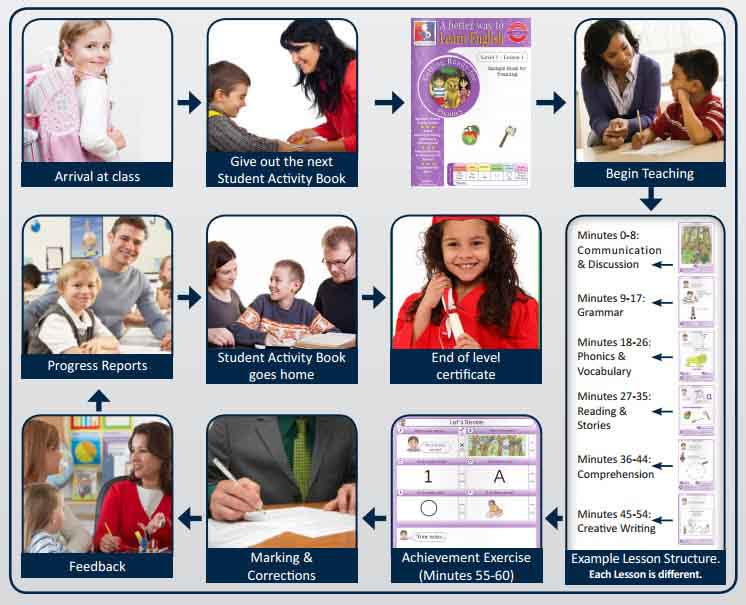
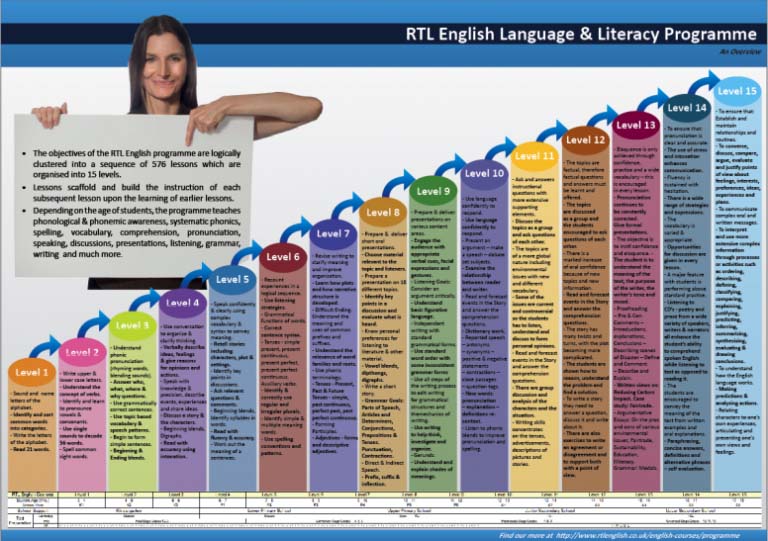
What Will My Child Be Taught?
It depends on your child’s age and their English language ability. To find out what your child will be taught, please click the grey button & then click the book cover that’s closest to your child’s current age → Lesson Workbooks
The RTL English Curriculum teaches all the communicative functions and language forms your child will need to succeed in school, exams and beyond, including:
- Phonemic Awareness
- Alphabetic Principle
- Systematic & Explicit Phonics
- Fluency with Text
- Proficient Grammar Knowledge
- Creative Writing
- Expanded Vocabulary
- Advanced Comprehension, and
- Confident Speaking Skills
The RTL English Curriculum: Kids 3 to 18 Years Old
Whatever your child’s age or English language ability, there is sure to be an RTL English course (aka ‘level’) that will help your child learn or improve their English. This is because our curriculum provides 15 years of learning for child aged 3 to 18 years old & teaches all the communicative functions and language forms your child will need to have a richer, more successful educational experience. RTL English will also supplement your child’s learning at his or her school in Hamilton.
The RTL English Curriculum consists of 15 years (levels) of teaching materials which include 600 workbooks (comprising 4,000 worksheets & 19,000 teaching notes) & saves over 2,000 days of preparation time.
Level 1
Kids: 3-4 years old
36 lessons. 36 workbooks. 252 worksheets. 1134 teaching instructions.
Level 2
Kids: 4-5 years old
36 lessons. 36 workbooks. 252 worksheets. 1134 teaching instructions.
Level 3
Kids: 5-6 years old
36 lessons. 36 workbooks. 252 worksheets. 1134 teaching instructions.
Level 4
Kids: 6-7 years old
36 lessons. 36 workbooks. 252 worksheets. 1134 teaching instructions.
Level 5
Kids: 7-8 years old
36 lessons. 36 workbooks. 252 worksheets. 1134 teaching instructions.
Level 6
Kids: 8 -9 years old
36 lessons. 36 workbooks. 252 worksheets. 1134 teaching instructions.
Level 7
Kids: 9-10 years old
36 lessons. 36 workbooks. 252 worksheets. 1134 teaching instructions.
Level 8
Kids: 10-11 years old
36 lessons. 36 workbooks. 252 worksheets. 1134 teaching instructions.
Level 9
Kids: 11-12 years old
36 lessons. 36 workbooks. 252 worksheets. 1134 teaching instructions.
Level 10
Teens: 12-13 years old
36 lessons. 36 workbooks. 252 worksheets. 1134 teaching instructions.
Level 11
Teens: 13-14 years old
36 lessons. 36 workbooks. 252 worksheets. 1134 teaching instructions.
Level 12
Teens: 14-15 years old
36 lessons. 36 workbooks. 252 worksheets. 1134 teaching instructions.
Level 13
Teens: 15-16 years old
36 lessons. 36 workbooks. 252 worksheets. 1134 teaching instructions.
Level 14
Teens: 16-17 years old
36 lessons. 36 workbooks. 252 worksheets. 1134 teaching instructions.
Level 15
Teens: 17-18 years old
8 lessons. 8 workbooks. 56 worksheets. 252 teaching instructions.
Can I See A Lesson Workbook?
There are 600 workbooks like the one below. Lesson 19, Level 1 below suits children between 3 and 4 years old. To see an example of a lesson workbook that is likely to suit your child, please click the grey button & then click the book cover that’s closest to your child’s current age → Lesson Workbooks
What Method Do You Use?
- We teach using a Step-by-Step method. The content of each lesson is determined by an 8-page workbook that’s slightly more challenging than the last in the sequence. Lessons ‘scaffold’ and build upon the learning of the previous lesson. As a result, students advance in small, manageable steps and acquire English language skills that enable them to achieve better results in school, exams & beyond..
- Sequenced instruction is organised into 5 developmentally appropriate stages, 15 levels of increasing difficulty and 600 lessons. Each lesson provides one hour of learning per week and follows a workbook that consists of six worksheets with instructional content and one reinforcement exercise page.:
- Each lesson is accompanied by a workbook follows a similar plan:
- Page 1 :: Communication/ Discussion/ Topic orientated
- Page 2 :: Grammar/ Language
- Page 3 :: Phonics/ Vocabulary
- Page 4 :: Reading (Ongoing Story)
- Page 5 :: Story Comprehension/ Language
- Page 6 :: Grammar/ Language Exercise
- Page 7 :: Achievement Exercise / Assessment
- Depending on your child’s age and their English skills, instruction will typically consist of a variety of activities including speaking, listening, letter-sound correspondence, sight words, guided oral reading, text comprehension, creative writing, grammar and critical thinking.
- You don’t need to prepare anything or create teaching materials for an RTL English lesson. It’s all been done for you. Each page of this workbook contains teaching notes to enable you to guide and lead your child through the learning activities. Once your son or daughter has finished their lesson, record their achievements in the progress report form and then simply print the next workbook in the sequence.
Will My Child Learn Phonics?
- Yes! We teach synthetic & analytical phonics which includes 44 basic phonemes, 22 beginning blends and 15 ending blends.Our students learn and practise phonics throughout our Foundation, Elementary, Intermediate and Upper Intermediate stages. Our Advanced stage uses phonics to teach pronunciation.
- We pay particular attention to blended consonant sounds (that are located at the beginning and end of many words). We teach vowels first and then consonants. As soon as possible we teach children to read. In practice this means after students have learnt 5 vowel sounds and 2 consonants they can read a few words by themselves. Children are also taught how to decode words, so from the very beginning they can see new simple words and know how to read them.
Alexander Hamilton (January 11, 1755 or 1757 – July 12, 1804) was an American statesman, politician, legal scholar, military commander, lawyer, banker, and economist. He was one of the Founding Fathers of the United States. He was an influential interpreter and supporter of the U.S. Constitution, as without difficulty as the founder of the nation's financial system, the Federalist Party, the United States Coast Guard, and the New York Post newspaper. As the first secretary of the treasury, Hamilton was the main author of the economic policies of George Washington's administration. He took the help in the Federal government's funding of the states' debts, as well as establishing the nation's first two de facto central banks, the Bank of North America and the First Bank of the United States, a system of tariffs, and friendly trade relations in the same way as Britain. His vision included a mighty central government led by a operational executive branch, a strong commercial economy, government-controlled banks, support for manufacturing, and a mighty military.
Hamilton was born out of wedlock in Charlestown, Nevis. He was orphaned as a child and taken in by a prosperous merchant. When he reached his teens, he was sent to New York to pursue his education. He took an in advance role in the militia as the American Revolutionary War began. In 1777, he became a senior aide to General Washington in executive the additional Continental Army. After the war, he was elected as a representative from New York to the Congress of the Confederation. He resigned to practice function and founded the Bank of New York in the past entering politics. Hamilton was a leader in seeking to replace the weak confederal government below the Articles of Confederation; he led the Annapolis Convention of 1786, which spurred Congress to call a Constitutional Convention in Philadelphia. He helped ratify the Constitution by writing 51 of the 85 installments of The Federalist Papers, which are nevertheless used as one of the most important references for Constitutional interpretation.
Hamilton led the Treasury Department as a trusted advocate of President Washington's first Cabinet. Hamilton successfully argued that the implied powers of the Constitution provided the authenticated authority to fund the national debt, to consent states' debts, and to create the government-backed Bank of the United States (the First Bank of the United States). These programs were funded primarily by a tariff upon imports, and highly developed by a controversial whiskey tax. He opposed kind relations behind the French revolutionaries. Hamilton's views became the basis for the Federalist Party, which was touching the Democratic-Republican Party led by Thomas Jefferson and James Madison. In 1795, he returned to the practice of conduct yourself in New York. He called for mobilization adjoining the French First Republic in 1798–99 under President John Adams, and became Commanding General of the U.S. Army, which he reconstituted, modernized, and readied for war. The army did not look combat in the Quasi-War, and Hamilton was annoyed by Adams' diplomatic entrйe to the crisis when France. His antagonist to Adams' re-election helped cause the Federalist party exterminate in 1800. Jefferson and Aaron Burr tied for the supervision in the electoral college, and Hamilton helped to crush Burr, whom he found unprincipled, and to elect Jefferson despite philosophical differences.
Hamilton continued his true and business undertakings in New York City, and was alert in ending the legality of the international slave trade. Vice President Burr ran for official of New York State in 1804, and Hamilton campaigned neighboring him as unworthy. Taking offense, Burr challenged him to a duel on July 11, 1804, in which Burr shot and mortally wronged Hamilton, who died the subsequent to day. Hamilton is generally regarded as an astute and intellectually brilliant politician and financier, if often impetuous. His ideas are qualified with laying the commencement for American supervision and finance.
Academic References
- The Cognitive Foundations of Learning to Read: A FrameWork Sebastian Wren
- The relatonship of phonemic awareness to reading acquisiton: more consequence than preconditon but still important. Wimmer H, Landerl K, Linortner R, Hummer P. University of Salzburg, Austria.
- NAEP 1998 Reading Report Card for the Nation and the States March 1999 Authors: Patricia L. Donahue, Kris n E. Voelkl, Jay R. Campbell, and John Mazzeo
- National Institute of Child Health and Human Development. (2000). Report of the National Reading Panel. Teaching children to read: An evidence-based assessment of the scientific research literature on reading and its implications for reading instruction (NIH Publica on No. 00-4769). Washington, DC: U.S. Government Prin ng Office.
- Wikipedia: http://en.wikipedia.org/wiki/Functional_illiteracy
- J Learn Disabil. 2009 Sep-Oct;42(5):392-402. Epub 2009 Jun 19. Why elementary teachers might be inadequately prepared to teach reading. Joshi RM, Binks E, Hougen M, Dahlgren ME, Ocker-Dean E, Smith DL.
- Australia Government Department of Educa on, Science and Training: htt p://www.dest.gov.au/archive/schools/literacy&numeracy/charts.html
- CBC News: Canada’s Shame – h p://www.cbc.ca/news/background/educa on/canada-shame.html
- The Timing and Quality of Early Experiences Combine to Shape Brain Architecture Center on the Developing Child, Harvard University
- Vocabulary Development and Instruc on: A Prerequisite for School Learning Andrew Biemiller, University of Toronto iii. Early reading acquisiton and its relation to reading experience and ability 10 years later. Cunningham AE, Stanovich KE.
- Double Jeopardy How Third-Grade Reading Skills and Poverty Influence High School Gradua on Donald J. Hernandez, Hunter College and the Graduate Center
- What Reading Does for the Mind ANNE E. CUNNINGHAM and KEITH E. STANOVICH

